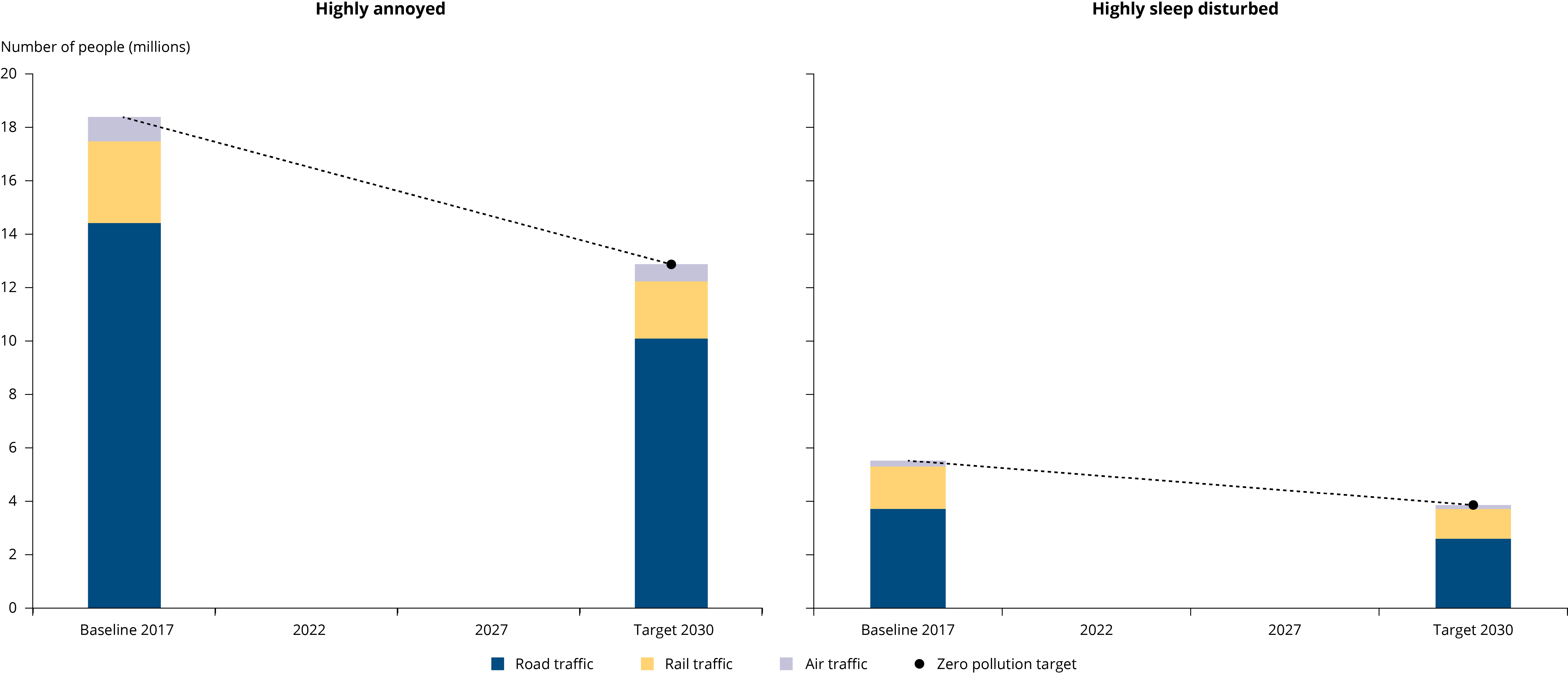All official European Union website addresses are in the europa.eu domain.
See all EU institutions and bodiesEstimated number of people highly annoyed and highly sleep disturbed by noise from road, rail and aircraft traffic based on EU Environmental Noise Directive thresholds in the EU-27 and zero pollution target for 2030
Chart (static)
Data submitted by countries up to 01/01/2021

- Austria
- Belgium
- Bulgaria
- Croatia
- Cyprus
- Czechia
- Denmark
- Estonia
- Finland
- France
- Germany
- Greece
- Hungary
- Ireland
- Italy
- Latvia
- Lithuania
- Luxembourg
- Malta
- Netherlands
- Poland
- Portugal
- Romania
- Slovakia
- Slovenia
- Spain
- Sweden
Methodology
The indicator is based on the following data:
- Data reported by EU Member States in accordance with Directive 2002/49/EC (the END). In addition, we present a disaggregated assessment for road traffic noise which includes EEA member countries (excluding Turkey). The data used covers population exposed to the END noise thresholds (i.e. noise levels of 55 dB or higher during the day-evening-night period and to night-time noise levels of 50 dB or higher) for noise sources such as roads with more than 3 million vehicle passages a year, railways with more than 30,000 train passages per year and airports with more than 50,000 aircraft movements per year, as well as all roads, railways, airports and industries in urban areas with more than 100,000 inhabitants
- Exposure-response functions for high annoyance and high sleep disturbance presented in the Environmental noise guidelines for the European region (WHO Europe, 2018). These are generalised functions and are in line with Annex III of the Environmental Noise Directive (EC, 2020)
- Data on age distribution from Eurostat (ETC/ACM, 2018). The population over the age of 17 years is used to calculate the number of highly annoyed, and highly sleep disturbed people because the exposure-response functions are based on responses from the adult population and cannot be extrapolated to children.
- The calculation of IHD incidence, premature deaths as well as the calculation of DALYs are described in (EEA, 2020; ETC/ACM, 2018)
It should be noted that, for the data presented in this indicator, countries have used a wide variety of calculation methods and approaches in developing their noise maps. Therefore, the results of the different countries or years generated by different prediction methods may not be fully comparable and therefore trends reported should be interpreted with caution. Due to the introduction of the common noise calculation assessment method in 2019 as well as other changes related to the distribution of people in dwellings to the most exposed façade, the baseline data will be re-evaluated in the future in order to overcome any comparability issues between 2017 and forthcoming years.
Units
Number of people suffering high annoyance and high sleep disturbance due to noise from road, rail and aircraft traffic (millions)
Additional information
- The risk of developing negative health effects when exposure is long term start to occur below the END thresholds. WHO recommends reducing noise levels to 53dB Lden and 45dB Lnight for road traffic, 54dB Lden and 44dB Lnight for rail traffic, and 45dB Lden and 40dB Lnight for air traffic.
- This chart is based on data officially reported by countries under the EU Environmental Noise Directive (2002/49/EC). There are inconsistencies across countries, as Member States were allowed to use their own national methods.
- There may be double counting in locations where there is exposure from multiple sources. It is estimated that double counting is less than 13% for high annoyance and less than 16% for high sleep disturbance (ETC/ACM, 2018).
- High annoyance and sleep disturbance are prevalent cases. Values are rounded
- Methodology for estimating missing data, by ETC/ATNI 2020 (https://www.eionet.europa.eu/etcs/etc-atni/products/etc-atni-reports/etc-atni-report-06-2021-noise-indicators-under-the-environmental-noise-directive-2021-methodology-for-estimating-missing-data)
- Methodology used for calculating health impacts from noise based on the data reported under the Environmental Noise Directive (END), by ETC/ACM 2018.(https://www.eionet.europa.eu/etcs/etc-atni/products/etc-atni-reports/eionet_rep_etcacm_2018_10_healthimplicationsnoise)
